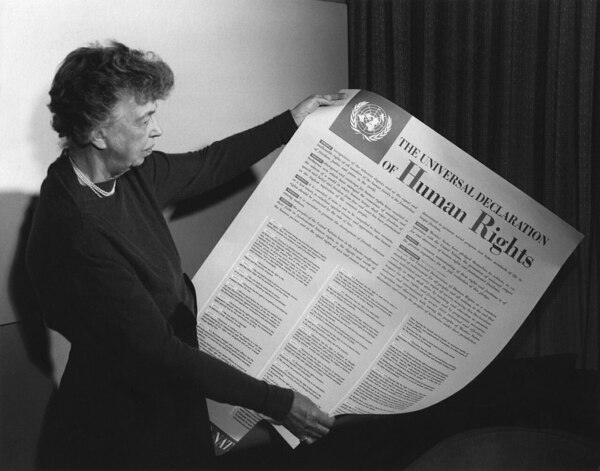
Eleanor Roosevelt, chair of the United Nations Human Rights Commission, holding poster of the Universal Declaration of Human Rights (in English), Lake Success, New York. November 1949. FDR Presidential Library & Museum, CC BY 2.0, via Wikimedia Commons.
“Where, after all, do universal human rights begin? In small places, close to home – so close and so small that they cannot be seen on any maps of the world. Yet they are the world of the individual person; the neighbourhood he lives in; the school or college he attends; the factory, farm or office where he works…Unless these rights have meaning there, they have little meaning anywhere.”
- Eleanor Roosevelt, 1958
On December 10, 1948, when the United Nations General Assembly ratified the original Universal Declaration of Human Rights (UDHR) at its General Assembly meeting in Paris, the world was in the midst of a rebirth. World War II had ended three years earlier, and the international community was barely beginning to grapple with the collective grief and loss this horrific war had caused worldwide. In these existential dust trails, the united, international community knew it must discern, collectively and immediately, how to ensure this type of widespread atrocity could never be replicated; so, in this spirit, the United Nations was formed to seek a lasting international peace.
The UN’s foundational charter was adopted at the San Francisco conference on June 26, 1945, and talks began almost immediately about the need to create a supplemental document that would outline and codify “a road map to guarantee[ing] the rights of every individual everywhere” in a non-legally-binding manner. These “supplemental document talks” ultimately culminated in the official ratification of the aforementioned UDHR on December 10, 1948, in Paris by the UN General Assembly. According to the official UN voting record, 48 member states voted “yes,” 10 abstained, none voted “no,” and two non-voting member states (Honduras and Yemen) were marked as “present” at the official ratification of the document.
The following decades would witness Cold War power plays; the widespread decolonization and eventual redeclarations of independence of several Asiatic and African countries during the 1950s, 60s, and 70s; and the dissolution of the USSR in the late 1980s and early 90s, with its subsequent border restructurings and reassertions of independent statehood by countries formerly classed as part of the Communist USSR conglomerate. Yet, hope in unity remained.
A recontextualized narrative, a rekindled spirit

Since the UDHR’s original 1948 adoption, another 135 countries have joined the United Nations as member-states, which means that not even one-third of the full number of present UN member-states were in the room at the ratification of a document that, by its own assertion, was created in the spirit of guaranteeing “the rights of every individual everywhere.”
This gap presents an opportunity for the international community today to engage with what a realistic lasting peace rooted in equality looks like through a recontextualized narrative of revitalized hope with the voices of all UN member states. Clemens Sedmak, in his role as professor of social ethics and director of the Nanovic Institute for European Studies, recognized this opportunity for reflection and renewal, from within the framework of the institute’s 2021-26 strategic plan. This roadmap includes five focal research priorities, including “human dignity” and “peripheries,” which informed and inspired his proposal for a conference at the Keough School of Global Affairs from November 9-10, 2023, to explore questions like:
-
“What would it look like if the 135 UN-member states that have joined the UN since the UDHRs Dec. 10, 1948, adoption had fully equitable voices on the UN world stage?”
-
“Do they even have voices today? What does that look like?”
-
“If they don’t, what can we, both on individual and societal levels, do to ensure these unheard voices are centered, amplified, heard, believed, and treated as the equal partners they are in this collective calling to facilitate international peace that ‘guarantees the rights of every individual everywhere’?”
As a response and invitation to explore these questions through practical, policy, and philosophical-oriented discussions and solutions, Sedmak, in his opening remarks for this UDHR conference, spoke of the primary need for a renewed discursive narrative that would ignite “a rekindling of the 1948 spirit [of the original UDHR] to reset and carry on” and allow for the “many stories that shape the landscape of the text that we celebrate today, its history and roots, its impact and relevance” to be told in ways, and with the nuances, that fully epitomize the “biography of [a] text that is 75 years old [and] is rich, colorful, complex, and full of ambiguities.” In other words: voices not being heard currently need to be listened to, centered, amplified, and given the power and platform to ensure the recontextualized narrative of the UDHR, upon the auspices of its 75th anniversary, takes into account the ways it has both succeeded and failed in its ambitions to enshrine the “rights of every individual everywhere” thus far. This process will allow the 1948 spirit of hope to continue to authentically permeate the UDHR’s legacy both today and in the years ahead.
Sustainable development goals as context for human rights
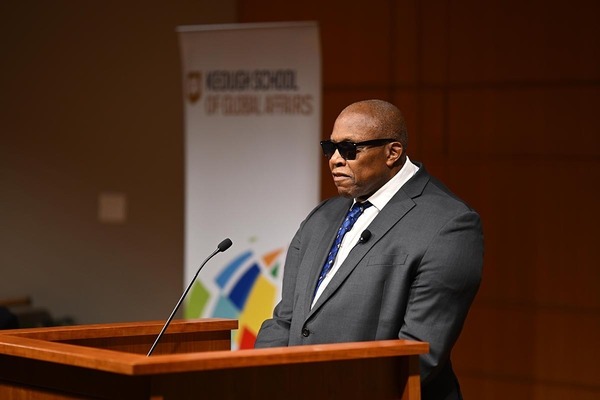
Ambassador Walton Webson, who is the permanent representative to the United Nations in New York for Antigua and Barbuda, and the esteemed guest of the Kellogg Institute for International Studies at the conference, spoke poignantly in his keynote address (entitled: “Human Rights, a Foundation for Justice and Equality: Fulfilling the Promise of the Sustainable Development Goals”) about how he has experienced firsthand what it is like to not have his or his country’s voice valued and heard on the world stage:
“I recall as a young man, very young...I was an activist for persons with disability, and...I recall being invited to a meeting, just as is done often in many international institutions, even today...I was invited to this meeting, and I was asked to ‘state my case.’ I state my case, [they] said, ‘Thank you very much, we’ve heard you now, we will now deliberate, you can go.’” He tapped the podium. “And I was like, ‘So, I do not hear the discussion as to how you are treating my case?’ ‘We will tell you what the result is tomorrow.’”
In describing this dynamic further, Ambassador Webson mused about how “the rules are made, and it’s told to us, and we have to follow [them].” Ironically, these same “rule-makers” often then fall short, making “many promises, with very little delivery” on the pledges they seem so confident in taking the lead on formulating, waxing poetic about, and crediting themselves for composing. Often little is done policy-wise, and marginalized countries and peoples still suffer the worst for it. Despite these chess games still occurring in the halls of international diplomacy today, Ambassador Webson remained positive and hopeful in describing practical ways these narratives can continue to be rewritten in more equitable, just, and inclusive ways as 2024 rounds the corner.
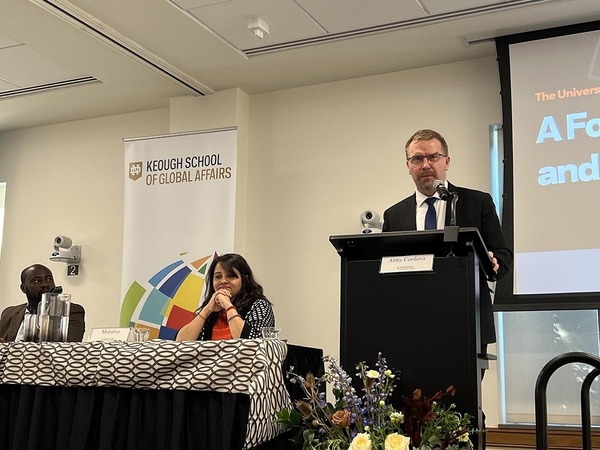
He highlighted the UN’s sustainable development goals (SDGs), borne of talks and negotiations at the 2015 Paris Climate Accord, as beacons of hope. He explained how these SDGs, grounded in the “right to development” birthed out of movements and ideas of African countries and the small island states in the 1960s, are a framework for the international community to engage with and within for referential guidance on how to navigate what the continuing enshrinement and protection of the universal inherent human rights and dignity of all its peoples looks like in the present day. He spoke of the need to prioritize ensuring that newer UN entities, such as the small island states Ambassador Webson represents, have equitable voices that are heard, listened to, and equally partnered with in collective international peace efforts at the present-day UN table of power as well, rather than having their concerns politely relegated to the UN’s echo chambers and all-but-dismissed as they have been in years prior.
Igniting the 1948 UDHR spirit today
What actions, however seemingly small, can individuals, universities, companies, and economies, ignite within their spheres of influence, here and now, that will “rekindle the 1948 spirit” of the UDHR?
Crucial to ensuring this representation occurs is also the prioritization of robust dialogue and discussion surrounding topics and concerns covered in the four panels of the Keough conference, such as through the weaving of pluralistic wisdom found in diverse dignity traditions worldwide (the topic of the conference’s second panel) into the textual fabric of the documents drafted and discussions floated in future UN General Assemblies. The panels also addressed how revised international financial institutional architectures and the delivery of long-promised aid to remedy climate change can serve as immediate, easy, practical steps to aid countries who, as Ambassador Webson so eloquently expressed, “will be no more but the people will be” if nothing changes.
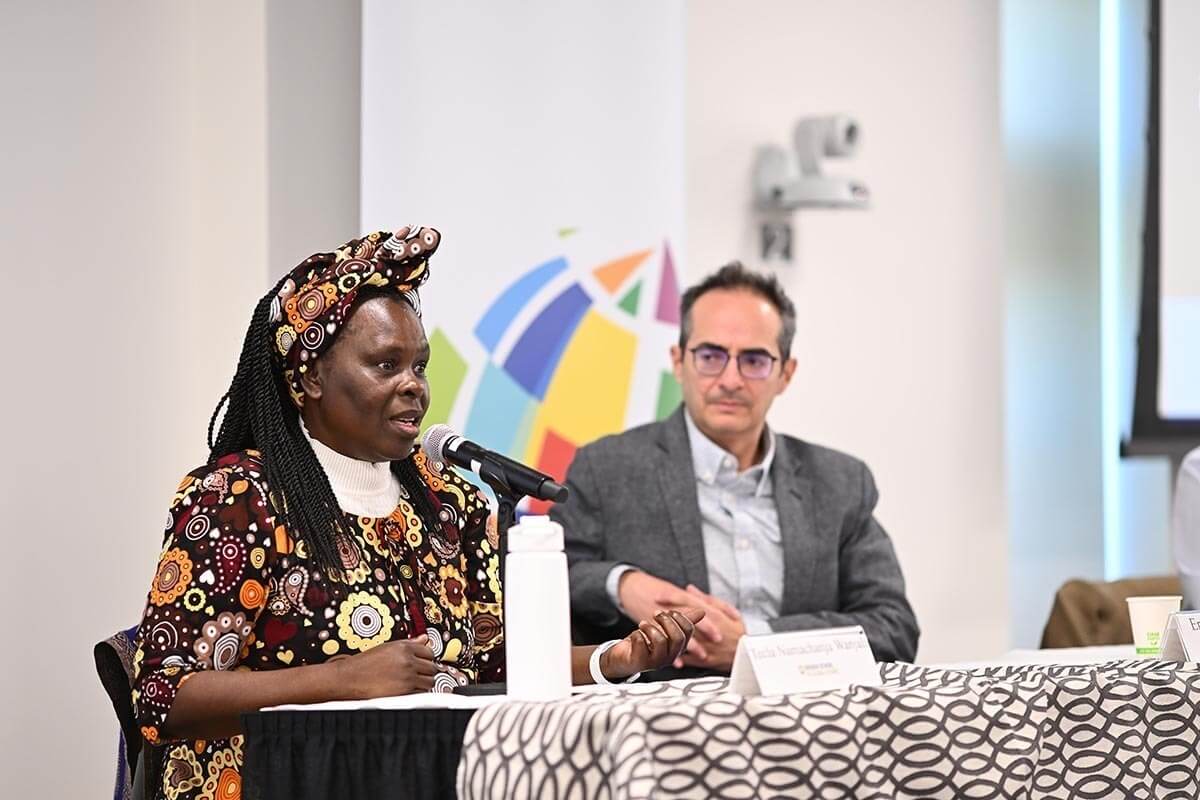
The question then begs itself: is this actually possible? Which actions, however seemingly small, can individuals, universities, companies, and economies, ignite within their spheres of influence, here and now, that will “rekindle the 1948 spirit” of the UDHR—one of “genuine solidarity and brotherhood among men and women of from all latitudes”—and allow it to “reset and carry on” almost a quarter of the way into the 21st century and beyond?
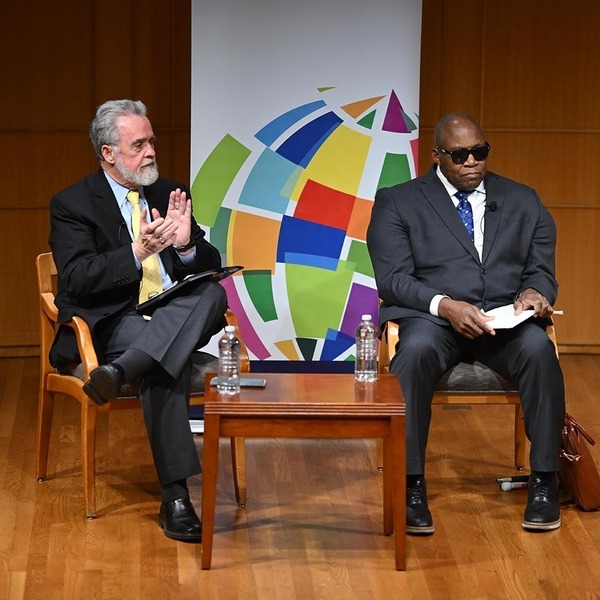
Perhaps Ambassador Webson said it best when he answered a question a current Notre Dame first-year student of business analytics and global affairs, Bernice Antoine, posed to him in the post-keynote Q&A about what her role and responsibility is as a Caribbean diasporic student from Trinidad and Tobago at an American university in ensuring the “continued centering of Caribbean voices on the global stage” in these “pivotal talks about climate change” [and other issues]:
“What we have not heard...in industrial societies like the United States,” he said, “is enough young voices calling for change...demanding their university, demanding their state, demanding their country to do things for climate change and to transform. That is what you can do here.” He went on: “We want youth voices...and your voice, my sister, is the voice that can be part of that champion.”
Clearly, true reignition of the original 1948 UDHR spirit of hope demands that all voices be heard, so “no one” and their rights, as Ambassador Webson emphasized in his keynote, “gets left behind.” No one.
Eleanor Roosevelt, one of the founding voices of the UDHR, also said as much in 1958 when she asserted that “without concerted citizen action to uphold [human rights] close to home, we shall look in vain for progress in the larger world.”
Our shared, recognized understanding, then, that the “inherent dignity...of the equal and inalienable rights of all members of the human family is the foundation of freedom, justice and peace in the world,” not only reaffirms Roosevelt’s original assertion ten years after the UDHR’s ratification, but demands that this reality be nothing less than rekindled, here, at this moment, beginning with us—today, now, and always.
Will we heed the call?
*This event was presented by the Keough School of Global Affairs and its institutes and centers:
- Ansari Institute for Global Engagement with Religion;
- Kellogg Institute for International Studies;
- Keough-Naughton Institute for Irish Studies;
- Klau Institute for Civil and Human Rights;
- Kroc Institute for International Peace Studies;
- Liu Institute for Asia and Asian Studies;
- McKenna Center for Human Development and Global Business;
- Nanovic Institute for European Studies; and
- Pulte Institute for Global Development.